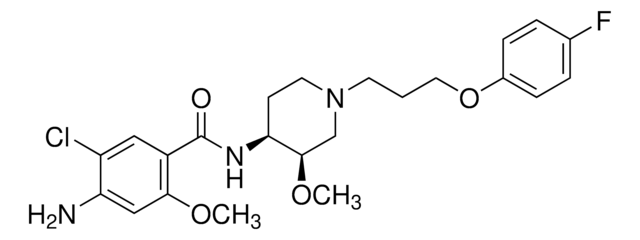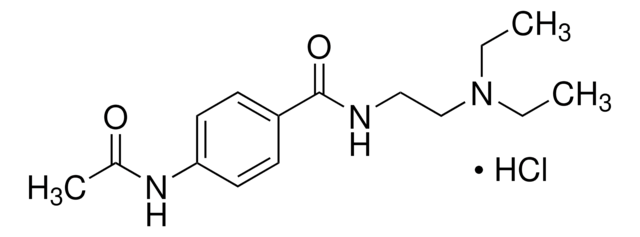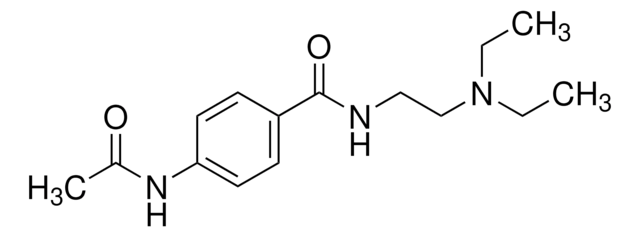S0278
(±)-Sotalol hydrochloride
≥98% (TLC), powder, β-Adrenoceptor antagonist
Synonym(s):
N-[4-[1-Hydroxy-2-(isopropylamino)ethyl]phenyl]methanesulfonamide hydrochloride
About This Item
Recommended Products
product name
(±)-Sotalol hydrochloride, ≥98% (TLC), powder
Quality Level
Assay
≥98% (TLC)
form
powder
color
white to off-white
solubility
H2O: 20 mg/mL
originator
Bayer
SMILES string
Cl.CC(C)NCC(O)c1ccc(NS(C)(=O)=O)cc1
InChI
1S/C12H20N2O3S.ClH/c1-9(2)13-8-12(15)10-4-6-11(7-5-10)14-18(3,16)17;/h4-7,9,12-15H,8H2,1-3H3;1H
InChI key
VIDRYROWYFWGSY-UHFFFAOYSA-N
Gene Information
human ... ADRB1(153) , ADRB2(154) , ADRB3(155) , KCNH2(3757)
Looking for similar products? Visit Product Comparison Guide
Application
Biochem/physiol Actions
Features and Benefits
Storage Class Code
11 - Combustible Solids
WGK
WGK 3
Flash Point(F)
Not applicable
Flash Point(C)
Not applicable
Personal Protective Equipment
Certificates of Analysis (COA)
Search for Certificates of Analysis (COA) by entering the products Lot/Batch Number. Lot and Batch Numbers can be found on a product’s label following the words ‘Lot’ or ‘Batch’.
Already Own This Product?
Find documentation for the products that you have recently purchased in the Document Library.
Customers Also Viewed
Articles
DISCOVER Bioactive Small Molecules for Neuroscience
DISCOVER Bioactive Small Molecules for Neuroscience
DISCOVER Bioactive Small Molecules for Neuroscience
DISCOVER Bioactive Small Molecules for Neuroscience
Chromatograms
application for HPLCapplication for HPLCapplication for HPLCOur team of scientists has experience in all areas of research including Life Science, Material Science, Chemical Synthesis, Chromatography, Analytical and many others.
Contact Technical Service















